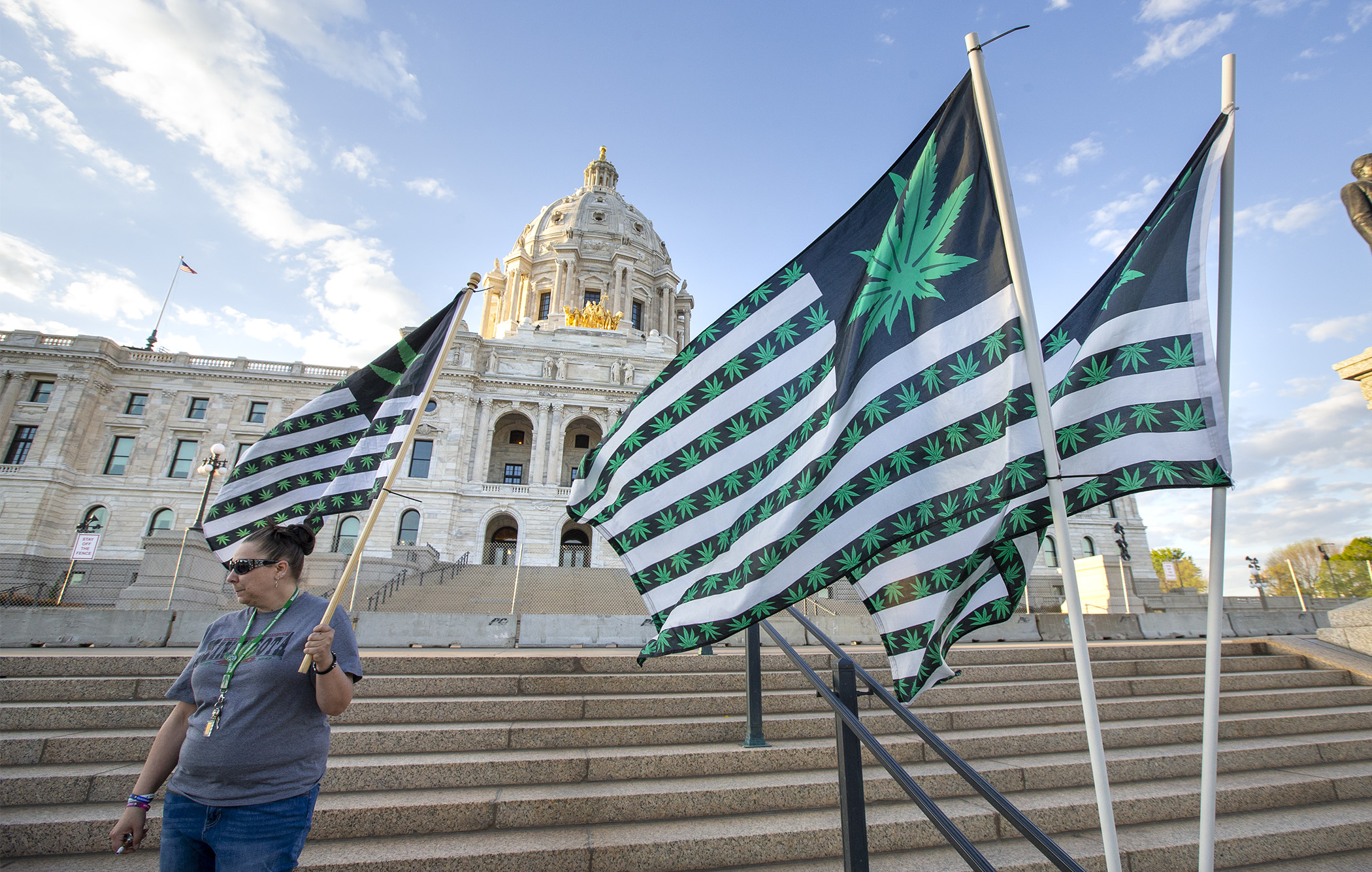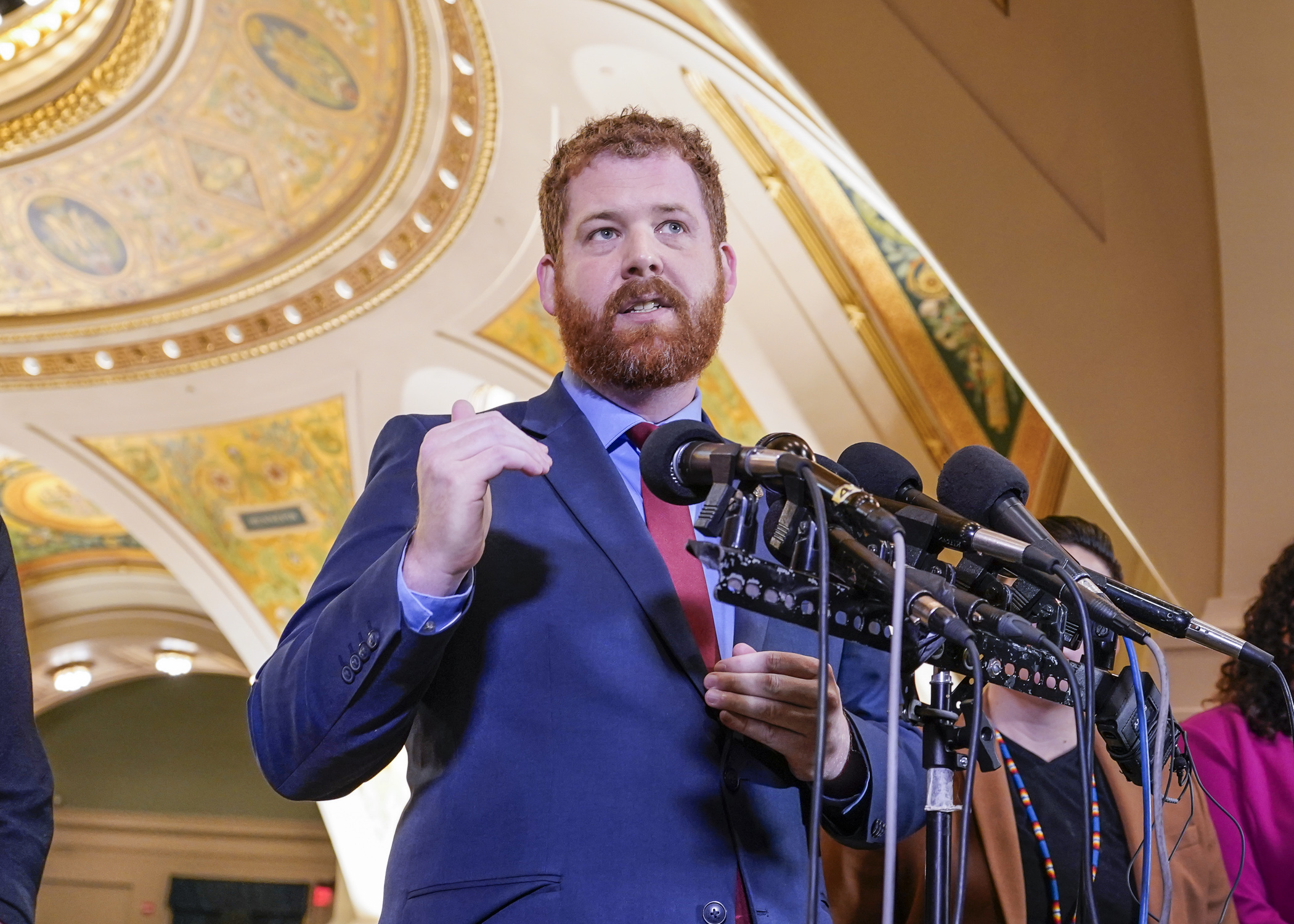House passes finalized cannabis legalization bill, sends it to Senate

The House gave the green light to adult-use recreational cannabis Thursday.
“The day has finally arrived. Today is the day that we are going to vote here in the House for the last time to legalize cannabis and bring the change that many Minnesotans have wanted for a very long time,” said Rep. Zack Stephenson (DFL-Coon Rapids), the bill sponsor.
The House adopted the conference committee report on HF100, and repassed the adult-use recreational cannabis legalization bill 73-57. Legalization has been primarily a DFL issue, but the vote was not strictly along party lines: one DFLer voted against it and five Republicans voted for it.
If the Senate repasses the bill, maybe as soon as Friday, and it’s signed by Gov. Tim Walz, recreational marijuana usage would become legal Aug. 1. The governor has previously expressed support.
There would be several legal limits on marijuana use, and civil penalties for violating those limits.
Per the bill, adults could possess up to two pounds of cannabis in the home or no more than two ounces in public. They could not, for example, operate a motor vehicle while under the influence of cannabis; give cannabis to a person under age 21; or smoke or vape cannabis in a multifamily housing building, on the grounds of a child care facility or family or group family day care program.
The bill would make significant changes in many parts of Minnesota law by:
- creating more than a dozen types of licenses for growing, selling, transporting and testing cannabis;
- creating an Office of Cannabis Management to regulate cannabis and take enforcement actions;
- creating and funding programs to combat cannabis abuse; and
- creating grants to assist individuals entering the legal cannabis market.
Stephenson said a key aspect of the bill is beginning to undo years of social injustice by expunging certain low-level marijuana offenses from criminal records.
Criminalizing cannabis has disproportionally hurt communities of color, he said, noting that Black Minnesotans have been almost six times more likely than whites to be arrested for cannabis possession, even though both groups use marijuana about equally.
 Rep. Zack Stephenson (DFL-Coon Rapids), the sponsor of HF100, speaks during a news conference before the initial floor vote on his bill April 23. (House Photography file photo)
Rep. Zack Stephenson (DFL-Coon Rapids), the sponsor of HF100, speaks during a news conference before the initial floor vote on his bill April 23. (House Photography file photo)“We will begin the process of undoing the cost of prohibition on communities all across the state by beginning expungements,” he said of the process where records are removed from public view and won’t appear in background checks. “That will enable tens of thousands of Minnesotans to get jobs, to get housing, to have full and complete lives.”
Several Republicans agree with helping people get low-level marijuana offenses cleared, but that is not enough to overcome their concerns that legalizing cannabis makes for bad public policy.
“Legalizing recreational marijuana creates a host of public safety issues. No roadside sobriety test currently exists,” said Rep. Jeff Witte (R-Lakeville), a former peace officer.
The bill would appropriate $15 million in the 2024-25 biennium to the Office of Traffic Safety to train drug recognition evaluators. And $2.6 million in the biennium would fund a roadside testing pilot project.
Rep. Kristin Robbins (R-Maple Grove) appreciates the funding for drug recognition expert training, but it’s not sufficient.
“Law enforcement has testified that they are not ready. People are going to start legally using Aug. 1. The drug recognition expert training takes a lot of time. We will not have nearly the capacity in law enforcement to be ready for that.”
Rep. Nolan West (R-Blaine), one of the five Republicans who voted for the bill, is pleased it would include protections to help hemp producers compete with cannabis retailers. “The existing hemp industry needs to survive, and they shouldn’t be punished for investing in a new law that we just legalized last year.”
Last year the Legislature legalized recreational cannabis edibles for adults provided each edible contained a maximum of 5mg of THC and only if the THC was derived from hemp.
Medical marijuana became legal in Minnesota in 2014, and Stephenson said the bill has protections to help them stay in business if recreational cannabis significantly shrinks their prescription market.
Licensed medical suppliers could produce and sell recreational cannabis, with the exact amount allowed based on the percentage of their business lost to newly licensed recreational cannabis retailers.
The bill would appropriate $79.9 million in the 2024-25 biennium to establish statewide and local structures to regulate and manage cannabis sales, fund prevention and addiction recovery programs, and provide grants to law enforcement and courts.
[MORE: View the final agreement spreadsheet]
A 10% retail tax on cannabis would be established, which would be in addition to the state’s 6.875% sales tax and any other locally imposed sales taxes.
Finding the right level of taxation is key, Stephenson said. Setting it too low would not bring enough revenue into state coffers to make legalization revenue neutral but setting it too high would not reduce or eliminate the illegal cannabis market, which he said is one of the main reasons to support legalization.
The bill would send 20% of the retail taxes collected to a local government cannabis aid special revenue account. Funds would be distributed each year to cities and counties; a portion distributed in equal amounts to all 87 counties and most of the rest distributed based on the number of cannabis retailers in a county.
Related Articles
Search Session Daily
Advanced Search OptionsPriority Dailies
Speaker Emerita Melissa Hortman, husband killed in attack
By HPIS Staff House Speaker Emerita Melissa Hortman (DFL-Brooklyn Park) and her husband, Mark, were fatally shot in their home early Saturday morning.
Gov. Tim Walz announced the news dur...
House Speaker Emerita Melissa Hortman (DFL-Brooklyn Park) and her husband, Mark, were fatally shot in their home early Saturday morning.
Gov. Tim Walz announced the news dur...
Lawmakers deliver budget bills to governor's desk in one-day special session
By Mike Cook About that talk of needing all 21 hours left in a legislative day to complete a special session?
House members were more than up to the challenge Monday. Beginning at 10 a.m...
About that talk of needing all 21 hours left in a legislative day to complete a special session?
House members were more than up to the challenge Monday. Beginning at 10 a.m...